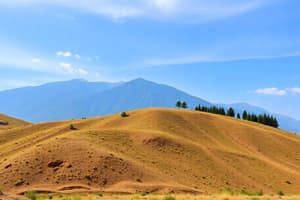Podcast
Questions and Answers
Define ecological footprint and discuss why we calculate it.
Define ecological footprint and discuss why we calculate it.
The ecological footprint is the amount of productive land needed to support each person's lifestyle. We calculate ecological footprint to show individuals how they affect the environment personally.
How does meat consumption affect your ecological footprint? Describe why.
How does meat consumption affect your ecological footprint? Describe why.
Meat consumption affects your ecological footprint because it takes a lot of energy to feed and prepare a cow for market. This involves multiple steps, such as farming corn for feed, which has a larger footprint compared to eating vegetables.
What are the 4 lifestyle categories that an ecological footprint is broken down into? Give one example of each that would cause a larger ecological footprint.
What are the 4 lifestyle categories that an ecological footprint is broken down into? Give one example of each that would cause a larger ecological footprint.
Mobility, shelter, food, and goods and services. For example, driving a car for mobility, living in a large house for shelter, consuming high amounts of meat for food, and buying many products and services contribute to a larger footprint.
What are the 5 different land uses an ecological footprint is broken down into?
What are the 5 different land uses an ecological footprint is broken down into?
Describe why the country you reside in is necessary information for calculating your ecological footprint.
Describe why the country you reside in is necessary information for calculating your ecological footprint.
In regards to how the amount of land you require to support your lifestyle is calculated in your ecological footprint, what is the difference between sources and sinks? Provide 2 examples of each.
In regards to how the amount of land you require to support your lifestyle is calculated in your ecological footprint, what is the difference between sources and sinks? Provide 2 examples of each.
Discuss why Americans have some of the biggest ecological footprints in the world.
Discuss why Americans have some of the biggest ecological footprints in the world.
Is it possible to have a high level of affluence and low ecological footprint? Explain.
Is it possible to have a high level of affluence and low ecological footprint? Explain.
What is the Human Development Index measure? What three indices is it based on?
What is the Human Development Index measure? What three indices is it based on?
Which land use takes up the biggest part of the average American's ecological footprint? Why?
Which land use takes up the biggest part of the average American's ecological footprint? Why?
What is the biocapacity of Earth? Has it been reached?
What is the biocapacity of Earth? Has it been reached?
Flashcards
Ecological Footprint
Ecological Footprint
Measures the amount of productive land needed to sustain a person's lifestyle.
Meat Consumption
Meat Consumption
Significantly increases your ecological footprint due to the energy and resources required.
Mobility
Mobility
Personal vehicle use affects ecological footprint.
Shelter
Shelter
Signup and view all the flashcards
Land Use Types
Land Use Types
Signup and view all the flashcards
Country of Residence
Country of Residence
Signup and view all the flashcards
Sources (Ecology)
Sources (Ecology)
Signup and view all the flashcards
Sinks (Ecology)
Sinks (Ecology)
Signup and view all the flashcards
Human Development Index (HDI)
Human Development Index (HDI)
Signup and view all the flashcards
Developed Land (in US)
Developed Land (in US)
Signup and view all the flashcards
Earth's Biocapacity
Earth's Biocapacity
Signup and view all the flashcards
Study Notes
Ecological Footprint Overview
- Ecological footprint measures the productive land required to sustain an individual's lifestyle.
- Calculation helps people understand their personal environmental impact.
Meat Consumption and Ecological Footprint
- Meat consumption significantly increases ecological footprint due to high energy costs in raising livestock.
- Producing beef involves multiple steps, such as farming corn to feed cattle.
Lifestyle Categories of Ecological Footprint
- Ecological footprint is categorized into four main areas:
- Mobility: Use of personal vehicles contributes to footprint.
- Shelter: Size and energy consumption of homes affect footprint.
- Food: Meat-heavy diets increase land use.
- Goods and Services: Consumer choices impact ecological sustainability.
Land Use Breakdown
- Five types of land use influencing ecological footprint include:
- Developed land
- Farmland
- Pasture
- Water bodies
- Forested areas
Importance of Country in Calculating Footprint
- The country of residence influences ecological footprint calculations based on local consumption patterns and resource sourcing.
Sources and Sinks in Ecosystem
- Sources: Entities that generate pollution, primarily contributing to CO2 emissions (e.g., cars, factories).
- Sinks: Natural systems that absorb pollution, helping mitigate environmental impact (e.g., forests, oceans).
American Ecological Footprint
- Americans tend to have one of the largest ecological footprints globally mainly due to widespread vehicle ownership and reliance on non-local products.
Affluence and Ecological Footprint
- High affluence can correlate with a low ecological footprint if individuals invest in efficient technologies and sustainable practices.
Human Development Index (HDI)
- HDI measures a country's development based on three indices:
- Education level
- Income
- Life expectancy
Largest Component of American Ecological Footprint
- Developed land constitutes the majority of the average American's ecological footprint due to its extensive spread across the country.
Earth's Biocapacity
- Earth's biocapacity represents the total biological capacity to regenerate resources.
- Current usage exceeds this by about 1.5 times, indicating sustainability challenges.
Studying That Suits You
Use AI to generate personalized quizzes and flashcards to suit your learning preferences.




